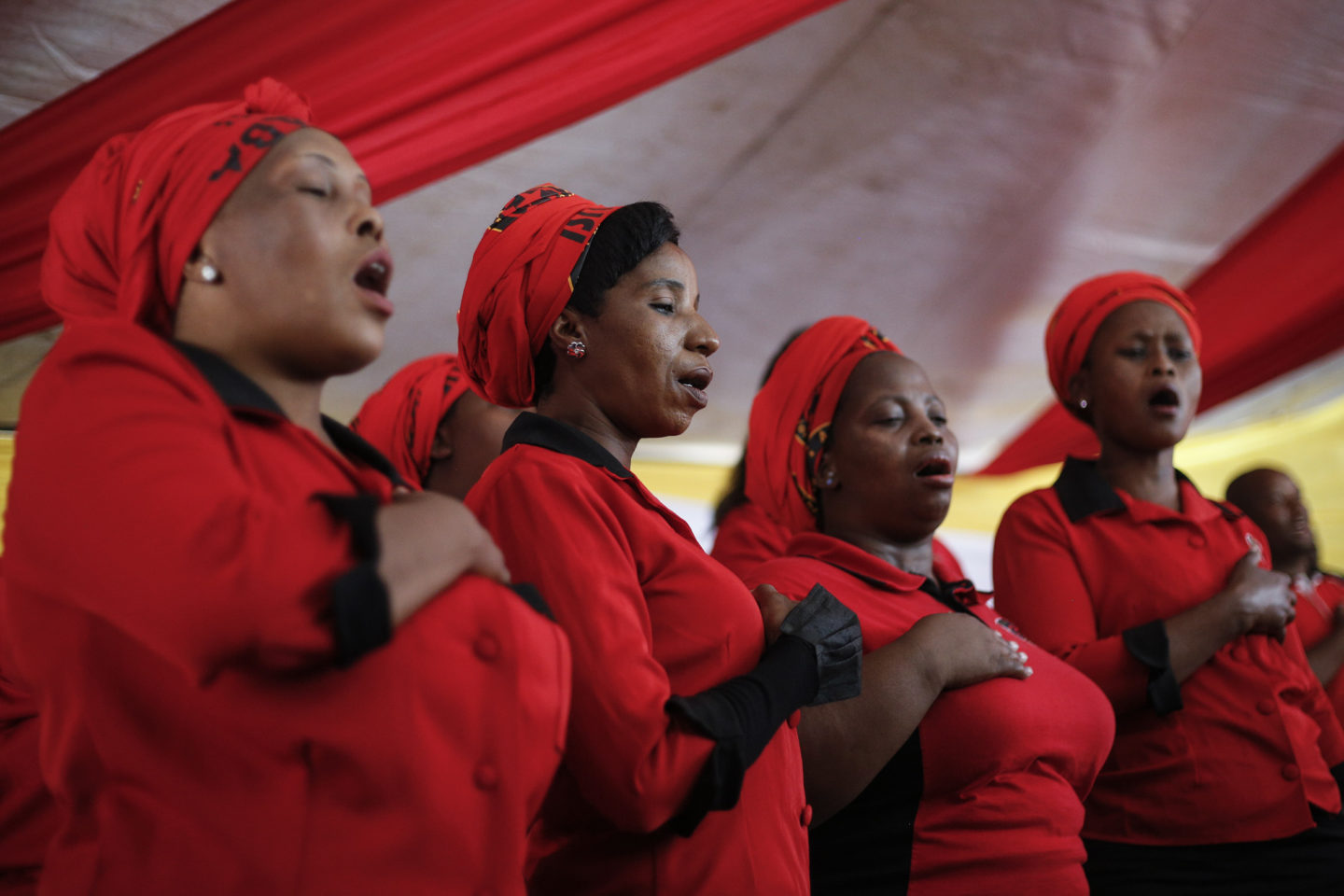Slain eKhenana activist Nokuthula Mabaso remembered
A leader of the commune’s food sovereignty projects, the fearless Mabaso had given most of her adult life to the struggle for land and dignity.
Author:
13 May 2022
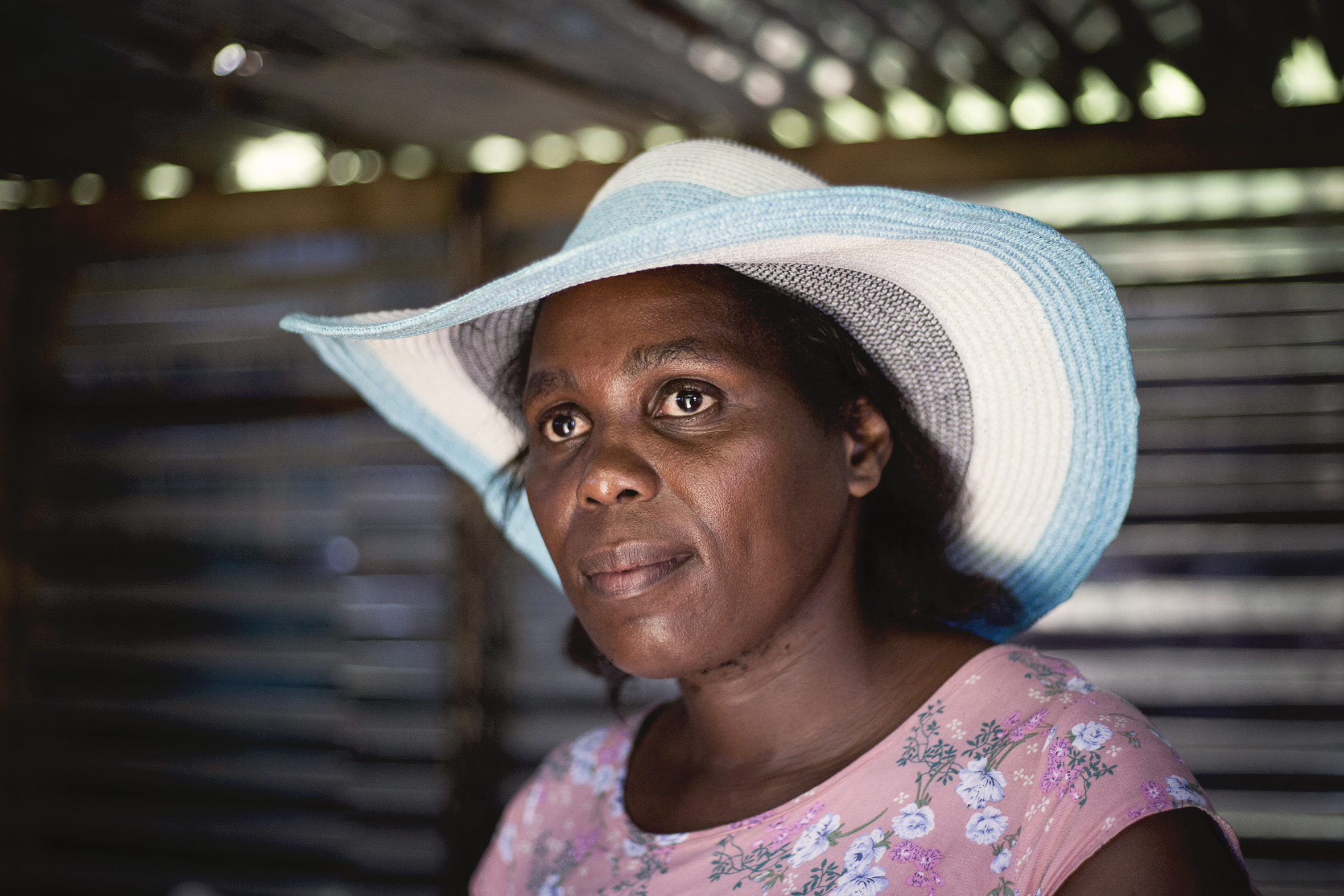
At 17 years old, Nokuthula Mabaso was faced with the double standards masquerading as traditional norms when she fell pregnant while still in high school. The “shameful” act enraged her father. He kicked her out of their family home and sent her to live with the father of her child. She remembered how her mother cried but did not have the choice or courage to plead her daughter’s case. “I left feeling shameful and regretful,” she said in an interview earlier this year.
“My father told me I had disgraced the family name and the only way it was to be fixed was for my boyfriend to pay damages and marry me, but we were both in school. I was still in standard six (grade 8). I loved school and had prospects of a better future. I knew that it was the key to my independence. I had already endured a life filled with hardship merely because of my womanhood.”
She returned to school shortly after giving birth. Her father heard about it and demanded she quit school in grade 9 because she was unmarried. After a year, her boyfriend finished matric and got a job as a security guard. The family moved from KwaMaphumulo in rural KwaZulu-Natal to a shack in Mayville, Durban.
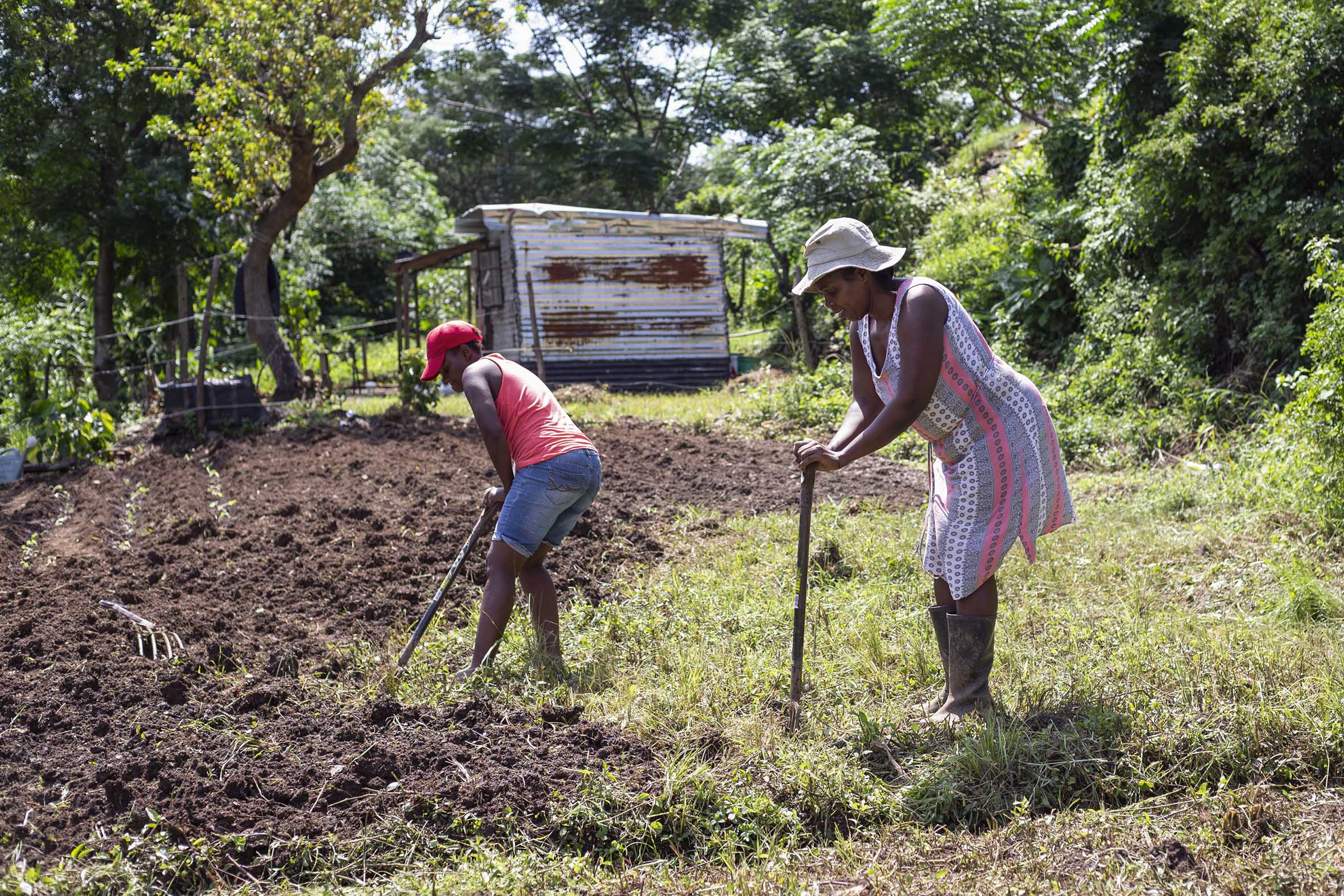

After a few years, they had established a family with three children. But her husband became abusive and threatened to kick her out with nothing but her “bags and underwear”.
Not finishing matric put Mabaso in a vulnerable position, as it would be difficult to get a job that could help support her family. But she fought. “I finally gathered the courage to leave him.” She rented a shack from an old woman in a different section of Mayville, but the municipality later offered her landlady alternative accommodation to make way for a road. Mabaso didn’t have long to find a new home before hers was razed. “In the midst of that uncertainty and chaos I heard about an occupation nearby.”
eKhenana hadn’t been named yet, but committed to the quest for land Mabaso sacrificed nights away from her children. Using the little money she received from child grants, she hired someone to care for them after school. She would quickly cook for the children and then return to work on the settlement. “It was important for me to have something I could finally call mine. When we got here, we didn’t know each other but we shared the struggles of landlessness,” she said. The settlement gave her and many others independence and a sense of identity and belonging.
Settling the commune
“From the beginning, we had a plan to first clear the site we had identified and built our first shack, called isitimela [after a train, the long and narrow hall resembling a carriage], where we would camp together and hold meetings. We were facing demolitions from the municipality and their security every day, but as soon as they would leave we would start over again. After a few days, we decided to each start building our homes and show the municipality that we were serious. Even that was tough, so some people didn’t make it to the first round.”
Finally, she had a place to call her own and a home for her and her children, who now numbered four. For eKhenana residents, establishing a life course that was completely independent from the state that had abandoned, killed and brutally demolished their homes was the fundamental rule. Mabaso’s emancipation plan was plotted using simple yet radical politics. She led sustainability projects to eradicate poverty, economic exclusion, crime and unemployment.
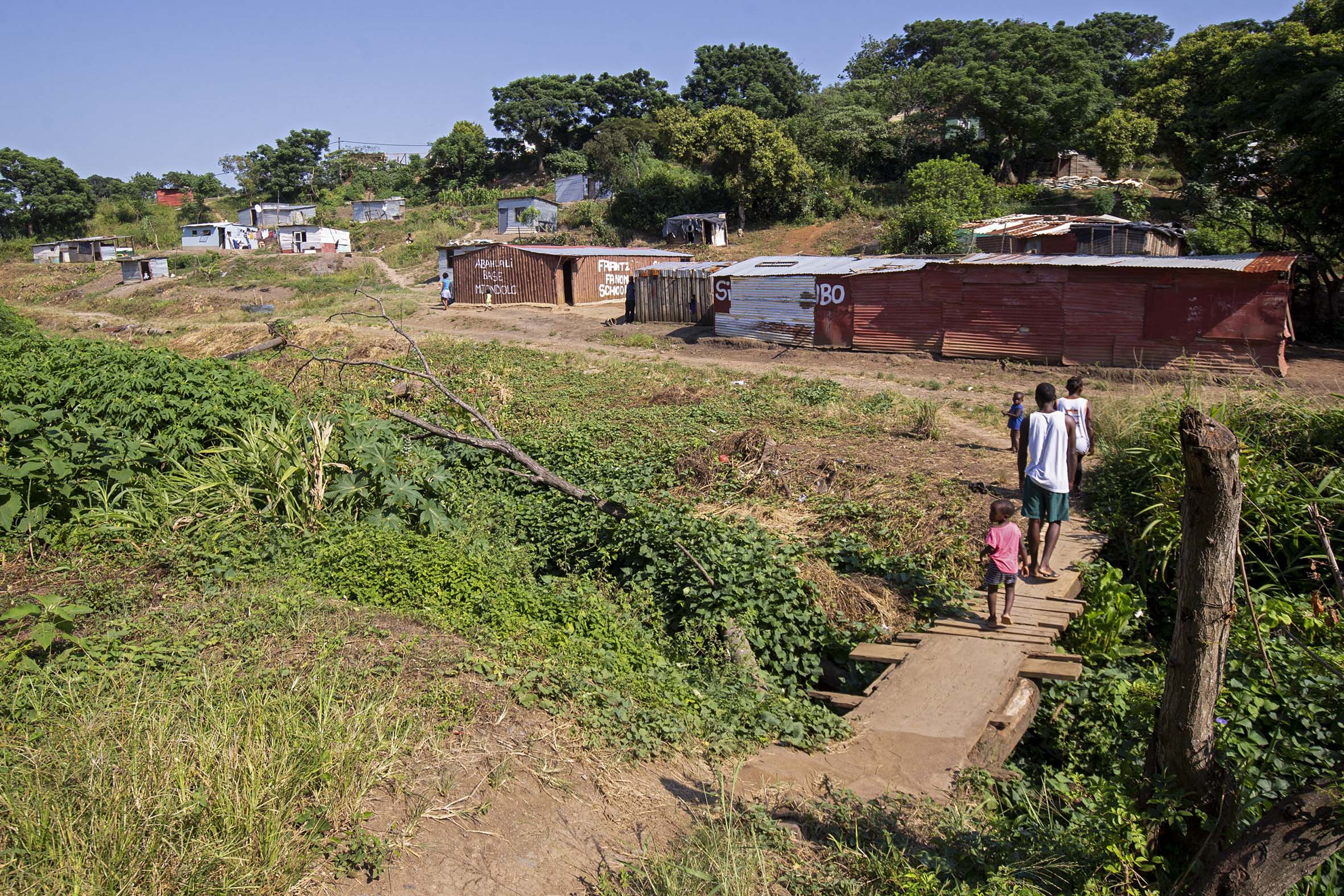

“Cato Manor is like an ANC den,” she said. “Almost everyone here is an ANC member, and so it was very easy for the neighbouring communities to cast us aside and deem us land thieves. We were told that we did not belong there. At some point, there was a group of local community members who came, accompanied by the ward councillor, to attack us and chase us away. Other strategies came from the City itself. They once told us that they want to move us to an area in Umkomaas in a block of flats.”
The residents of the settlement collected money to buy rolls of plastic and they used logs from trees to build houses, beds and tables. The trick was not to place any valuable items inside their structures because they knew that the municipality would be there the next day to burn them down. “But we lived there, we cooked together and slept in our houses. Each day, each of us had to have at least R30 to be able to contribute to the rolls of plastic that were burned with each demolition.
“I wanted to have my own place so desperately because I had seen how quickly you can lose your dignity and power as a woman without land or independence. It was so easy for men to take advantage of me and mistreat me because they knew I had no options, nowhere to go. In a way, it was liberation.”
A pivotal role
Mabaso and the father of her children reconciled and in 2018 they both moved to the commune. She dedicated her time to communal projects and activism as a member of shack dwellers’ movement Abahlali baseMjondolo.
She was instrumental in developing the commune’s food sovereignty projects, which included a poultry farm. This allowed the residents to generate enough revenue to sustain their community. But the numerous court cases they had to attend in their fight against the municipality depleted their savings, and with many leaders detained or living outside the area owing to bail conditions the vegetable garden and poultry farm fell apart.
“We knew that jobs are scarce and all of us agreed that we would instead create work for ourselves using our knowledge and skills. Everything, profits and food, was to be shared equally among each other to make sure nobody would go to bed hungry.”
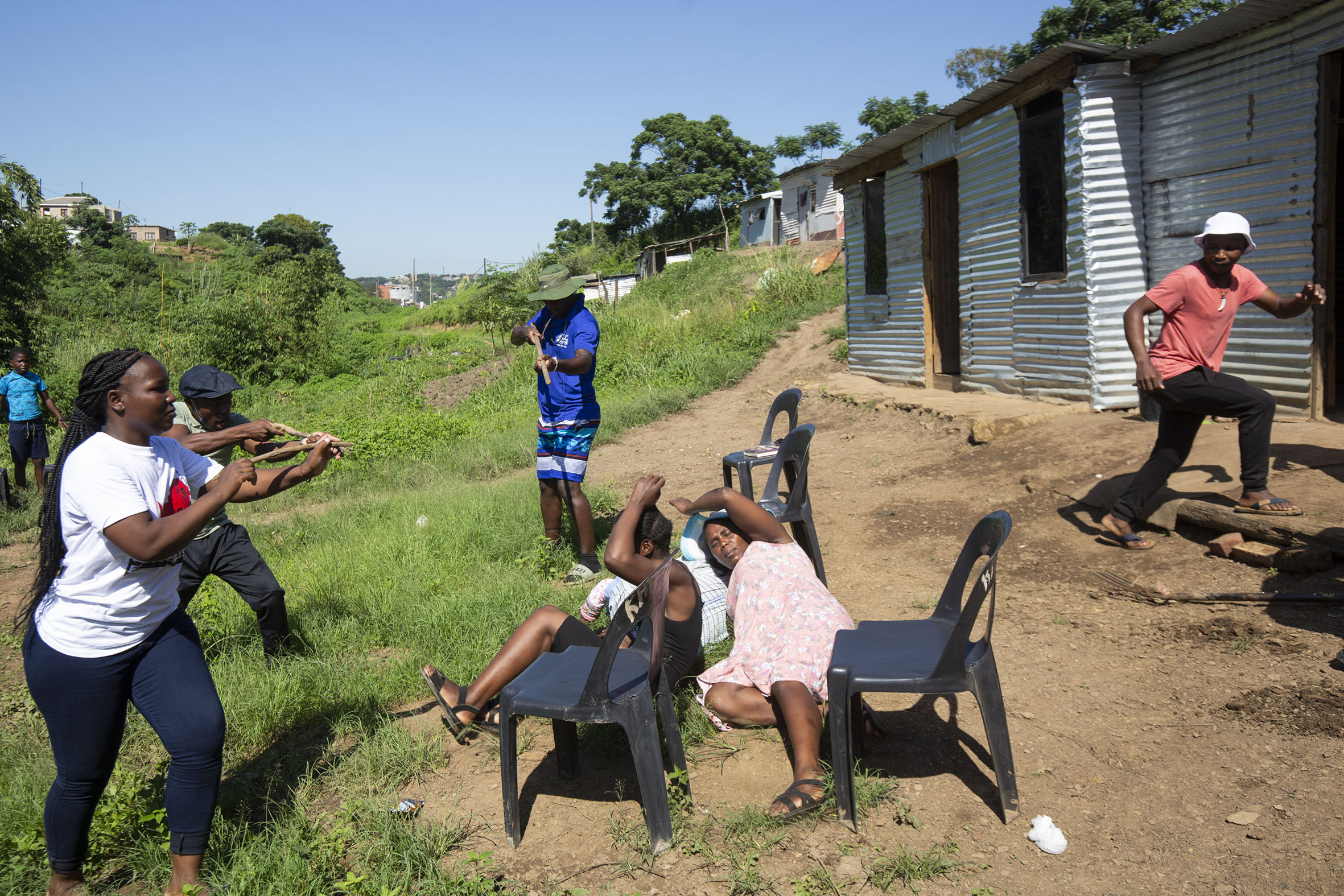

Mabaso described her understanding of this new way of life in which independence coexists with social unity. “You must first know who you are, your role in society and then identify where you need improvement, and when you work together with progressive people who want the same things it becomes easier. That’s why eKhenana operates like one big family. We know our strengths and weaknesses and maximise on what works,” she said.
“We made a collective decision that we would not sell or lease any piece of land here in eKhenana. We would keep it as it is and instead use the land available to improve our economic and living conditions.”
The eKhenana commune was inspired by Brazil’s Landless Workers Movement (Movimento dos Trabalhadores Rurais Sem Terra, or MST), which is based on Marxist and liberation ideologies. The MST emphasises equality and the transformation of capitalist society through agriculture, cooperation and protecting the environment.
State tyranny
In March 2021, when the commune had established a working schedule for the food sovereignty projects, violent repression from the state began to hit the community. Ayanda Ngila, Lindokuhle Mnguni and Landu Shazi were charged with murder that same month. They were held at Westville prison without bail for six months. The charges were later withdrawn and they were released on 1 October.
Two months later, Maphiwe Gasela, Siniko Miya and Abahlali deputy president Mqapheli Bonono were arrested on charges of conspiracy to commit murder. They were also denied bail and detained at Westville prison for two weeks before bail was granted. The charges against the trio were withdrawn on 4 October.
During this time, Mabaso continued to lead the community, often doing fundraising and maintaining what they could salvage from the garden and poultry project. But she, along with Thozama Mazwi and Sindiswa Ngcobo, were arrested on 8 October and charged with assault with intent to cause grievous bodily harm related to an incident that had taken place more than a year before.
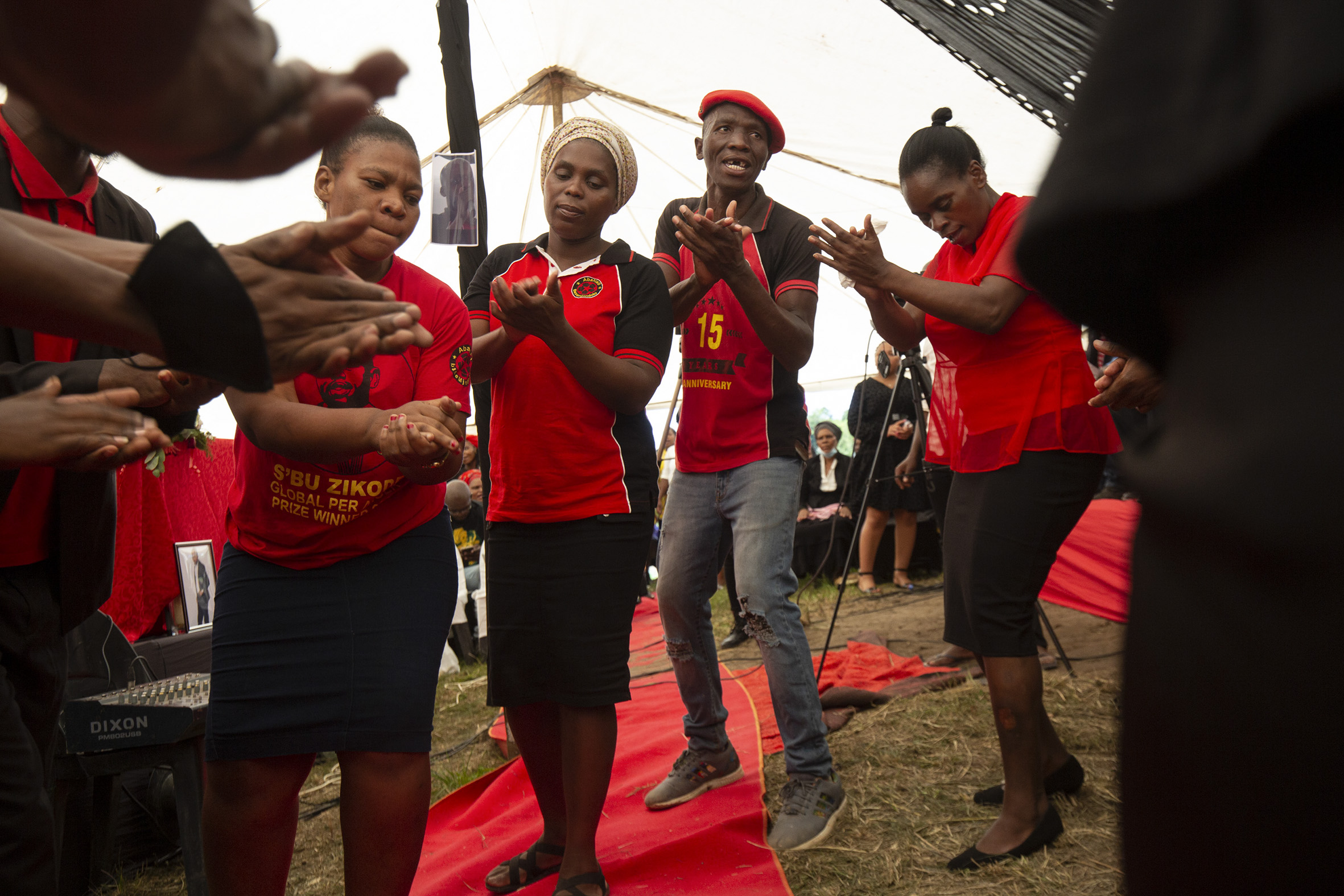

They were initially refused bail in the Durban magistrate’s court, but were later granted bail of R500 each. Their bail conditions included prohibiting them from returning to eKhenana. All charges against them were withdrawn on 4 February 2022.
When she returned to her home in eKhenana, Mabaso described how even though the community had no money, seed or chicken eggs left, they were still adamant to keep going. “My heart sinks when I look at what the garden and poultry now look like. It will take a lot of work to get them back into shape, and even harder to return hope to people who are mostly feeling scared now because of the violent suppression and attacks we continue to face.”
On 8 March, Ngila, a leader in the commune who had recently returned home after yet another unwarranted arrest, was shot in broad daylight in eKhenana. Mabaso, a witness to his murder, was assassinated at her home on 5 May, shot six times – four in the back – in front of her children.
Mabaso’s legacy
On 12 May, family, members of Abahlali and other activists came together at the commune to mourn her death. The tent pitched next to the poultry farm and Mabaso’s home rang with songs of liberation, struggle and mourning.
Eulogies were delivered by Abahlali president S’bu Zikode and its women’s league, residents of eKhenana, the Church Land Programme, Coalition of the Poor and other activists. All of them remembered Mabaso’s calm and fierce dedication to the movement, her compassion and visionary leadership. She was described as a polite and practical leader who encouraged women in the movement to create their own paths for sustainability through agriculture.
“She led the commune with calm and respect. She died believing in the idea of unity, health and wealth through land. She lived this practice and, as we saw it coming to life, they decided to silence her too,” said Zandile Nsibande, who leads Abahlali’s women’s league.
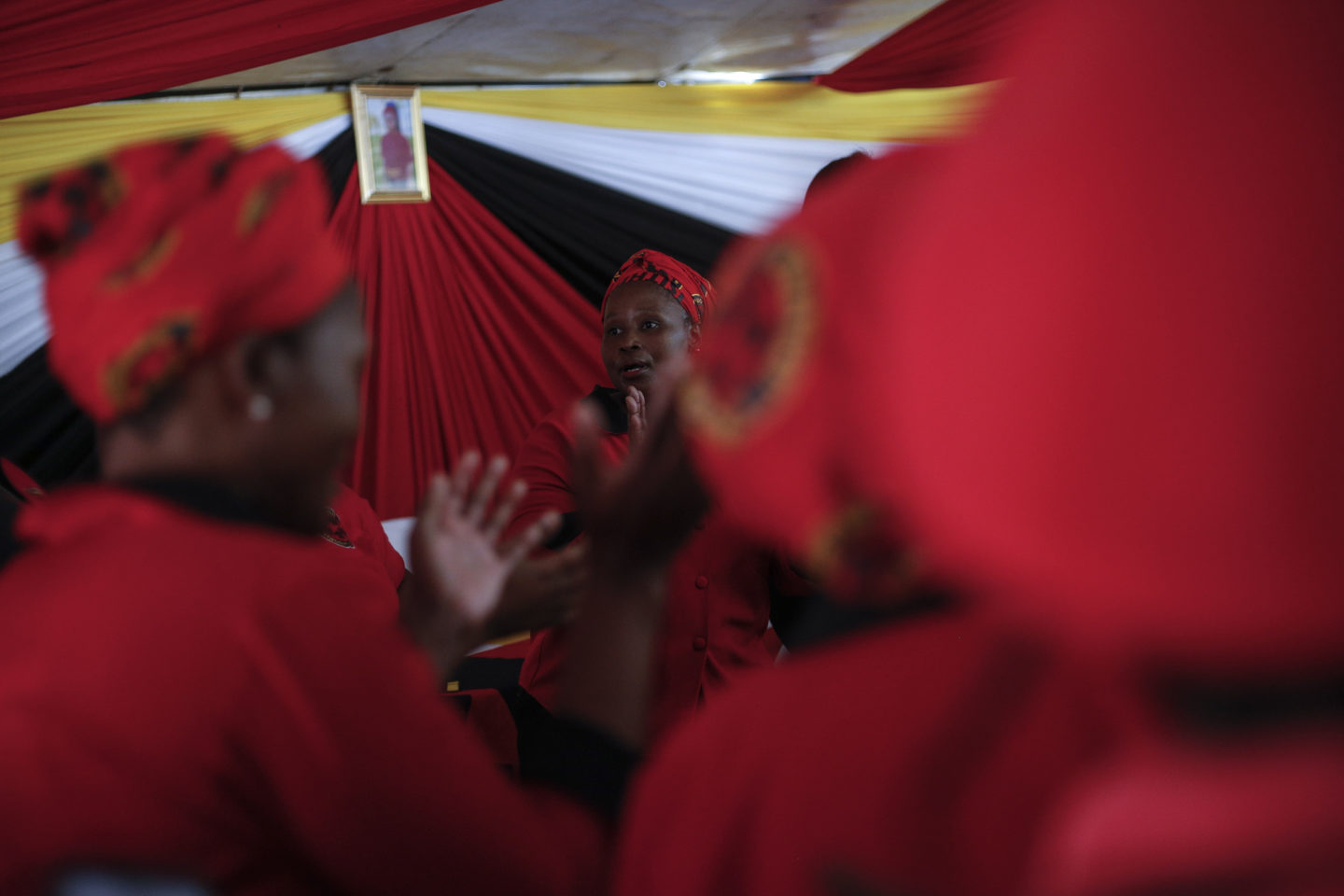

“She now follows women activists Nqobile Gwala and Nqobile Nzuza, whose deaths we will never forget. The justice system as we see it does not care or value the lives of poor Black women. This is why we want to send a strong message to Minister [of Police] Bheki Cele that we demand justice for Nokuthula and Ayanda Ngila. We will be coming out in numbers to take to the streets and say out loud that we want justice.”
Mabaso leaves behind her partner, four children, mother, two sisters and two brothers. Her funeral will take place at her home in KwaMaphumulo on Saturday 14 May.
